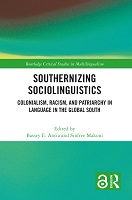Chapter 11 Minoritized youth language in Norwegian media discourse
Proposal review
Surfacing the abyssal line
Author(s)
Lomeu Gomes, Rafael
Svendsen, Bente A.
Language
EnglishAbstract
This chapter sets out to analyse what the representations of urban youth and their language practices in Norwegian media reveals about circulating discourses about diversity and immigration. The digital media archive Atekst (Retriever) was used to build a corpus composed of articles published between 2015 and 2021 in Norwegian print media. The analysis presented here indicates that “Kebabnorsk” (Kebab Norwegian) – a term commonly used to describe the speech styles of urban youths in Norway – is oftentimes mobilized in media debates to construct an axis of differentiation (i.e. us x them) regimented by ideological work where “us” is constructed as a category that encompasses “ethnic Norwegians” who uphold Western values and speak standard Norwegian, whilst “them” describes those who have ethnic minoritized backgrounds, uphold non-Western values, and speak “Kebabnorsk.” Moreover, the notions of coloniality and abyssal line help us to account for the political and historical development of the hierarchization of categorizations such as class, race, and gender from colonial times to the present. Aligned with ongoing efforts into southernizing sociolinguistics, this study expands the scope of existing research by bringing together traditions of critical discourse studies with theories of decoloniality and epistemologies of the South.
Keywords
Southernizing sociolinguistics; Southern Epistemologies; sociolinguistics; Global South; crticial sociolinguistics; Bassey E. Antia; Bassey E. AntiaDOI
10.4324/9781003219590-15ISBN
9781032113753, 9781032113869, 9781003219590Publisher
Taylor & FrancisPublisher website
https://taylorandfrancis.com/Publication date and place
2023Grantor
Imprint
RoutledgeClassification
Linguistics


 Download
Download